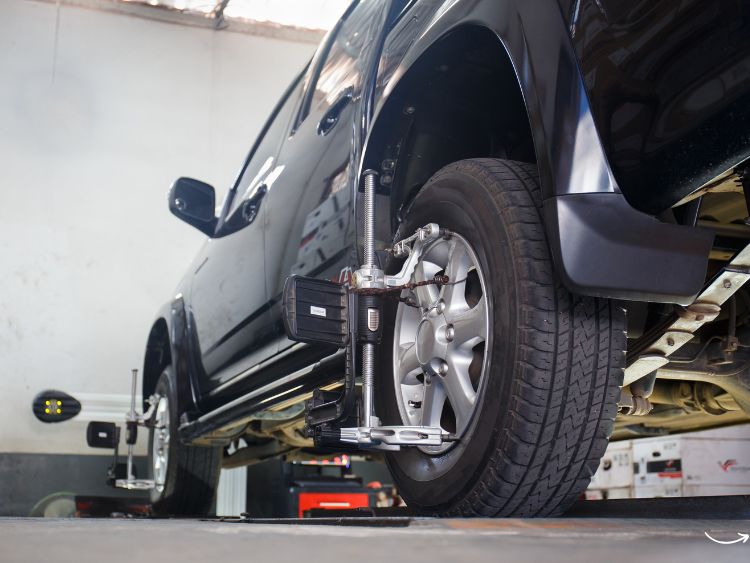Ever wondered why your car seems to drift to one side or why your tires wear out unevenly? It’s likely time for a wheel alignment! And guess what? A wheel alignment machine is the star of this show. In this comprehensive guide, we’ll delve into the ins and outs of wheel alignment machines, from their importance to their operation and everything in between. So, buckle up and let’s get started!
What Is a Wheel Alignment Machine?
A wheel alignment machine is a sophisticated piece of equipment used by automotive technicians to adjust the angles of a vehicle’s wheels to the manufacturer’s specifications. Proper alignment ensures your car drives straight, reduces tire wear, and improves overall handling.
How Does It Work?
The machine uses advanced sensors and cameras to measure the wheel angles. These measurements are then compared to the vehicle manufacturer’s specifications, and adjustments are made to align the wheels correctly. The primary angles adjusted are camber, caster, and toe.
Key Components
- Sensors and Cameras: Capture the current alignment status.
- Computer System: Analyzes the data and provides adjustment instructions.
- Lift: Raises the vehicle to allow access to the wheels.
- Adjusting Tools: Used to make the necessary adjustments to the wheel alignment.
Why Is Wheel Alignment Important?
Proper wheel alignment is crucial for several reasons:
Safety
Misaligned wheels can cause the vehicle to pull to one side, making it difficult to control. This can be particularly dangerous at high speeds or in adverse weather conditions.
Tire Longevity
Incorrect alignment leads to uneven tire wear, reducing the lifespan of your tires. Regular alignment checks can save you money in the long run by extending the life of your tires.
Fuel Efficiency
Believe it or not, misaligned wheels can increase rolling resistance, causing your vehicle to consume more fuel. Proper alignment ensures your car runs efficiently, saving you money at the pump.
Smooth Ride
Nobody likes a bumpy ride! Proper alignment ensures your car drives smoothly, enhancing overall comfort and driving pleasure.
Types of Wheel Alignment Machines
There are several types of wheel alignment machines, each with its own set of features and benefits. Let’s take a closer look.
1. 3D Wheel Alignment Machine
This is the most advanced type of alignment machine, using multiple cameras to create a 3D image of the wheel’s position. It’s known for its accuracy and speed.
2. CCD Wheel Alignment Machine
CCD (Charge-Coupled Device) alignment machines use digital sensors to measure the angles. They are highly accurate and commonly used in professional automotive shops.
3. Laser Wheel Alignment Machine
Laser alignment machines use laser beams to measure the wheel angles. They are less expensive than 3D and CCD machines but still offer good accuracy.
How to Use a Wheel Alignment Machine
Using a wheel alignment machine might seem daunting, but with a bit of practice, it’s a straightforward process. Here’s a step-by-step guide:
Step 1: Prepare the Vehicle
- Lift the Vehicle: Use the lift to raise the car and ensure it’s stable.
- Check Tire Pressure: Make sure all tires are inflated to the recommended pressure.
Step 2: Attach the Sensors
- Mount Sensors: Attach the sensors or targets to each wheel.
- Calibrate Sensors: Ensure the sensors are calibrated correctly.
Step 3: Perform the Alignment
- Run the Software: Use the computer system to run the alignment software.
- Adjust Angles: Follow the on-screen instructions to adjust the camber, caster, and toe angles.
- Verify Alignment: Double-check the alignment to ensure it’s within the manufacturer’s specifications.
Step 4: Test Drive
- Lower the Vehicle: Carefully lower the vehicle and remove the sensors.
- Test Drive: Take the car for a test drive to ensure it drives straight and handles well.
Benefits of Regular Wheel Alignment
Regular wheel alignment checks offer numerous benefits. Let’s explore some of them.
Improved Handling
A properly aligned vehicle handles better, providing a more responsive and enjoyable driving experience.
Enhanced Safety
As mentioned earlier, proper alignment is crucial for safe driving. It ensures your vehicle remains stable and predictable on the road.
Cost Savings
By preventing uneven tire wear and improving fuel efficiency, regular alignments can save you money on tires and fuel over time.
FAQs About Wheel Alignment Machines
How often should I get a wheel alignment?
It’s recommended to get a wheel alignment every 6,000 miles or whenever you notice signs of misalignment, such as uneven tire wear or pulling to one side.
Can I do a wheel alignment myself?
While it’s possible to perform a basic alignment at home, it’s best to have a professional technician with the right equipment do it for accuracy and safety.
How long does a wheel alignment take?
A typical wheel alignment takes about an hour, but it can vary depending on the vehicle and the type of alignment machine used.
How much does a wheel alignment cost?
The cost of a wheel alignment varies, but it generally ranges from $75 to $200, depending on the type of alignment and the location of the service.
What happens if I don’t get a wheel alignment?
Neglecting wheel alignment can lead to uneven tire wear, poor handling, reduced fuel efficiency, and even costly damage to your vehicle’s suspension system.
Summary
A wheel alignment machine is an essential tool for maintaining your vehicle’s performance, safety, and longevity. Regular wheel alignments ensure your car drives straight, handles well, and wears its tires evenly. Whether you’re a DIY enthusiast or prefer professional services, understanding the importance and operation of wheel alignment machines can help you keep your vehicle in top shape.
Remember, regular maintenance is key to a smooth and safe driving experience. Don’t overlook the importance of wheel alignment – your car (and your wallet) will thank you!

